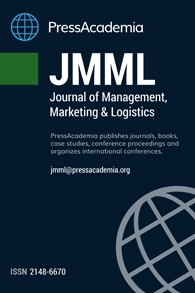EFFECTS OF TRANSATLANTIC TRADE and INVESTMENT PARTNERSHIP AGREEMENT ON CONTAINERIZED CARGO FLOW IN TRANSATLANTIC
EFFECTS OF TRANSATLANTIC TRADE and INVESTMENT PARTNERSHIP AGREEMENT ON CONTAINERIZED CARGO FLOW IN TRANSATLANTIC
TTIP, Economics, International Trade Seaborne Trade, Logistics,
___
- Anheier, H. K. & Isar, Y. R. 2008, “Cultures and Globalization: The Cultural Economy”, The Cultures and Globalization Series SAGE Publications Ltd.
- Banyai, Á. 2012, “Intermodal optimization with harmony search”, Advanced Logistic Systems, 6(1), 57-62.
- Barro, R.J. 2006, “Rare disasters and asset markets in the twentieth century”, The Quarterly Journal of Economics, 121(3), 823-866.
- CEPR. 2013, “Reducing transatlantic barriers to trade and investment: An economic assessment. Final Project Report”, Centre for Economic Policy Research, London, March 2013.
- Cheetham, R. 1998, “Asia Crisis. Paper presented at conference, U.S.-ASEAN-Japan policy Dialogue”, School of Advanced International Studies of Johns Hopkins University, 7–9 June, Washington, D.C
- Clift, J. & Diehl, E. 2007, “Financial globalization”, IMF Report, Washington: IMF.
- Ernst, D. & Kimb, L. 2002, “Global production networks, knowledge diffusion, and local capability formation”, Research Policy, 31(8–9), 1417–1429.
- Evans, P., & Sewell, W. H. 2013, “The Neoliberal Era: Ideology, Policy, and Social Effects”, See Hall & Lamont.
- Feigenbaum, H. B. 2002, “Globalization and cultural diplomacy”, Center for Arts and Culture, Art, Culture and the National Agenda Issue Paper.
- Hesse, M., & Rodrigue, J. P. 2004, “The transport geography of logistics and freight distribution”, Journal of Transport Geography, 12(3), 171-184.
- Hitt, A. M., Ireland, R. D., & Hoskisson, R. E. 2014, “Strategic Management: Competitiveness and Globalization- Concepts and Cases” (11th ed.). South-Western College Pub.
- Ianchovichina, E., & Martin, W. 2003, Economic impacts of China’s accession to the World Trade Organization, World Bank Policy Research Working Paper 3053, May 2003.
- Labonte, M. 2013, “Federal Reserve: Unconventional monetary policy options”, Congressional Research Service, 7-7500.
- Mansfield, E. D., & Reinhardt, E. 2003, “Multilateral determinants of regionalism: The effects of GATT/WTO on the formation of preferential trading arrangements”, International Organization, 57(04), 829-862.
- Mathews, J. A. 2006, “Dragon multinationals: New players in 21st century globalization”, Asia Pacific Journal of Management, 23(1), 5-27.
- Mishra, P., Moriyama, K., N'Diaye, P., & Nguyen, L.. 2014, “Impact of Fed tapering announcements on emerging markets”, IMF Working Paper 14/109.
- Morgan, G., Kristensen, P. H., & Whitley, R. 2003, The Multinational Firm: Organizing Across Institutional and National Divides, Oxford University Press.
- Morrison, W.M. 2001, “China and the World Trade Organization”, CRS Report for Congress, November 19, 2001. O'Rourke, K.H. & Williamson, J. G. 2000, “When did globalization begin?” NBER Working Paper No. 7632.
- Polychroniou, C. J. 2012, “Greece’s bailouts and the economics of social disaster”, Levy Economics Institute of Bard College.
- Roberts, J. T. 2000, From Modernization to Globalization: Perspectives on Development and Social Change, Blackwell Readers in Sociology Wiley-Blackwell.
- Reinhart, C.M., & Rogoff, K.S. 2014, “This time is different: A panoramic view of eight centuries of financial crises”, Annals of Economics and Finance, 5(2), 1065-1188.
- Rodrigue, J.P. 2007, “Transportation and globalization”, In Robertson, R. & Scholte, J. A. (Eds) Encyclopedia of Globalization, London: Routledge. https://people.hofstra.edu/jean-paul_rodrigue/downloads/Transportation%20and%20Globalization.pdf.
- Riain, S. Ó. 2000, “The flexible developmental state: globalization, information technology and the “Celtic Tiger””. Politics & Society, 28(2), 157-193.
- Shangquan, G. 2000, “Economic globalization: trends, risks and risk prevention”, CDP Background Paper No. 1.
- Shafaeddin, S. M, 2002, “Some implications of accession to WTO for Chinaís economy”, International Journal of Development, 1(2), 93-128.
- Skogstad, G. 2015, “The international trade regime: Liberalism and embedded liberalism”, Journal of International Law and International Relations, 11(2), 147-154.
- Soubbotina, T. P. 2004, “Beyond economic growth: An introduction to sustainable development”, World Bank Publications: Washington DC.
- UNCTAD, U. N. 2014, “Review of Maritime Transport”, United Nations.
- World Trade Organization 2015, “Press Release 2015” / Press 739: www.wto.org/english/news_e/pres15_e/pr739_e.htm.
- World Bank 2015, “World Bank Economic Review”, 29(3) Oxford Press.
- WTO 2015, “World Trade and The WTO: 1995-2014”, World Trade Organization
- Yayın Aralığı: Yılda 4 Sayı
- Başlangıç: 2014
- Yayıncı: PressAcademia
Hatice Genc KAVAS, Mehmet Celal GULTEKİN, Omer Fazil EMEK
Ahmet Zafer ACAR, Arda BALAKAN
COMPETITION ANALYSIS OF CONSUMER ELECTRONICS RETAILING NETWORKS IN TURKEY
Aykan CANDEMİR, Erhan ZALLUOGLU, Cihat KARSLİ, Asli DİYADİN
WORD OF MOUTH MARKETING: AN EMPIRICAL INVESTIGATION IN HEALTHCARE SERVICES
Cengiz DURAN, Aysel Cetindere FİLİZ, Arzu CETİNDERE, Suleyman TİRYAKİ
WHERE TO PRESENT THE ADVERTISEMENT IN A BLOCK?
THEORETICAL JOURNEY OF TALENT MANAGEMENT: EGALITARIAN AND ELITIST APPROACH
AN ANALYSIS OF LOGISTICS VILLAGES IN TURKEY: HALKALI AND YENICE
ANALYZING THE EFFECTS OF PERSONALITY TRAITS ON MOTIVATIONS FOR USING SOCIAL MEDIA
